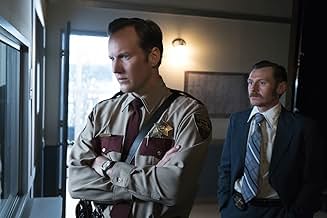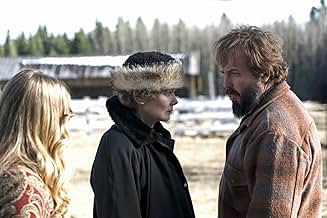Did You Do This? No, You Did It!
- Episode aired Nov 23, 2015
- TV-MA
- 1h 1m
The police bring in Floyd for questioning, in an attempt to make her talk. Bear goes on a ride with Simone. Karl keeps an eye on Lou's family.The police bring in Floyd for questioning, in an attempt to make her talk. Bear goes on a ride with Simone. Karl keeps an eye on Lou's family.The police bring in Floyd for questioning, in an attempt to make her talk. Bear goes on a ride with Simone. Karl keeps an eye on Lou's family.
- Peggy Blumquist
- (credit only)
- Noreen Vanderslice
- (as Emily Haine)
Featured reviews
And all throughout, pretty much every character gets some wicked dialogue to chew on. In that sense - hell, in every sense - this is classic Fargo.
10/10
What I Liked:
The cinematography is solid, and each scene perfectly implements its well-crafted and memorable music score. On top of that, each actor gives a strong performance.
As the gang war intensifies, each scene involving the Gerhardts and the Kansas City Mafia becomes tenser and tenser, making for some highly enthralling television.
Mike killing the Undertaker is perhaps the best scene to this point. The way he is introduced and then executed was ingenious by the writers.
What I Disliked:
I am not a fan of several editing choices, particularly the usage of split screens, which appear superfluous at best.
The philosophical rantings from Mike are starting to become forced and trite. He is still an interesting character, but it seems the writers are trying too hard to make him an intellectual thug.
Overall:
Fargo continues to deliver high-quality episodes, making for an enthralling and consistent sophomore season so far.
8/10
King Cadmium.
The episode's title, a line delivered amid a fraught family confrontation, encapsulates the tangled web of blame and responsibility that defines the narrative. The Gerhardt family, already fractured by internal strife and external threats, faces further turmoil as Floyd Gerhardt (Jean Smart) is taken into police custody and offered a deal to exonerate her family in exchange for cooperation. Jean Smart's performance here is a masterclass in restrained power and vulnerability, portraying a woman burdened by leadership and betrayal. The interrogation scenes, edited with split-screen techniques juxtaposing Floyd's calm resolve with the scheming of Mike Milligan (Bokeem Woodbine) at his hotel, heighten the episode's tension and underscore the shifting power dynamics.
A central and heart-wrenching moment unfolds with Simone Gerhardt (Rachel Keller), whose cover is blown after she sells out her family to the Kansas City mob. Keller delivers a painfully eloquent performance as Simone confronts the consequences of her actions, her desperation and betrayal culminating in a chilling scene where Bear Gerhardt (Angus Sampson) takes her for a fatal drive into the woods. The scene's direction and cinematography evoke classic mob drama, with a somber, almost elegiac tone reminiscent of The Sopranos' iconic "long drive" moments. This sequence stands as one of the season's most impactful, blending narrative closure with emotional complexity.
Mike Milligan's ruthless efficiency is on full display as he swiftly eliminates the Undertaker and his associates, asserting his dominance within the Kansas City syndicate. Bokeem Woodbine's portrayal balances charm and menace, making Milligan a compelling and unpredictable force. His interactions with law enforcement, particularly Lou Solverson (Patrick Wilson), highlight the season's thematic tension between order and chaos, with Milligan embodying the encroaching, modern criminal enterprise.
The episode also continues to explore the personal struggles of Betsy Solverson (Cristin Milioti), whose battle with cancer adds a poignant counterpoint to the surrounding violence. Milioti's nuanced performance captures Betsy's strength and vulnerability, particularly in her intimate conversations with Lou and Karl Weathers (Nick Offerman), whose presence adds a touch of levity and wisdom. These quieter moments provide emotional balance and deepen the series' human dimension.
Visually, "Did You Do This? No, You Did It!" excels with Craig Wrobleski's evocative cinematography capturing the bleak winter landscapes and the claustrophobic interiors of the Gerhardt farm and hotel rooms. The editing maintains a taut pace, skillfully intercutting between the various converging storylines while preserving narrative clarity. The musical score by Jeff Russo subtly underscores the episode's shifting moods, from suspense to tragedy.
Thematically, the episode delves into the corrosive effects of betrayal, the complexities of family loyalty, and the inexorable consequences of violence. The title's accusatory phrase reflects the characters' attempts to deflect blame even as their actions seal their fates. The episode invites reflection on the moral ambiguities that permeate the Fargo universe, where survival often demands impossible choices.
The episode was met with widespread acclaim. Reviewers praised its strong performances-especially from Jean Smart and Rachel Keller-its intense and well-crafted narrative, and its emotional resonance. The episode's blend of suspense, dark humor, and tragedy was highlighted as a high point of the season. Some critiques noted the episode's dense plotting required attentive viewing but agreed that its complexity added to its richness.
"Did You Do This? No, You Did It!" is a powerful and emotionally resonant episode that advances Fargo's second season with narrative sophistication and thematic depth. Through compelling performances, meticulous direction, and evocative production design, it immerses viewers in a world where family, loyalty, and violence collide with devastating consequences.
I enjoyed season 2 for far as much as season 1 to be honest, i don't think season 2 is THAT better then 1st. Acting is very solid, but performances in season 1 were a bit better, but that is because is of the story and the script. That said performances here are very good, with some great ones as well. Story is more action oriented, and that's good. There are some more weaker plot lines, but overall package in season 2 is very good, i do looking forward to see how it all will turn out at the end.
Overall, this episode is very good. Tension is rising, some decisions have been made, w'll see how it will end in the next 3 episodes. Great series so far.
Did you know
- TriviaMike Milligan's (Bokeem Woodbine) "Freedom, that terrible word..." is quoting from 'The Rebel: An essay on Man's revolt' by Noreen's (Em Haine) favorite author Albert Camus (who was himself quoting 19th century poet Philothee O'Neddy).
- GoofsWhen Simone is parking her car at the hotel, you can see that her 1979 Chevrolet is equipped with a third brake light on the back deck. These lights were not required before 1986.
However, the 1979 Chevy Nova (which Simone could be driving) came with an optional third brake light.
- Quotes
Mike Milligan: So... is this a conversation about how it's time for me to pack up and go home?
Lou Solverson: No. Don't have to go home. It's a big country. Just maybe don't be here.
Mike Milligan: Are you familiar with the phrase "manifest destiny"?
Lou Solverson: Yeah, but see, here's the thing. I own two pairs of shoes: a summer pair and one for winter. We're not meant to have more than we can handle, is what I mean. So, this need for conquest, you know, tryin' to own things that aren't meant to be owned...
Mike Milligan: Like people?
Lou Solverson: That's an example. But also places. Believin' we can tame things. That's a problem, right? Not a solution.
Mike Milligan: You're saying capitalism is a problem?
Lou Solverson: No. Greed. Makin' this thing all or nothin'.
- ConnectionsReferences Mutual of Omaha's Wild Kingdom (1963)
Details
- Runtime
- 1h 1m(61 min)
- Color
- Sound mix
- Aspect ratio
- 1.78 : 1



























